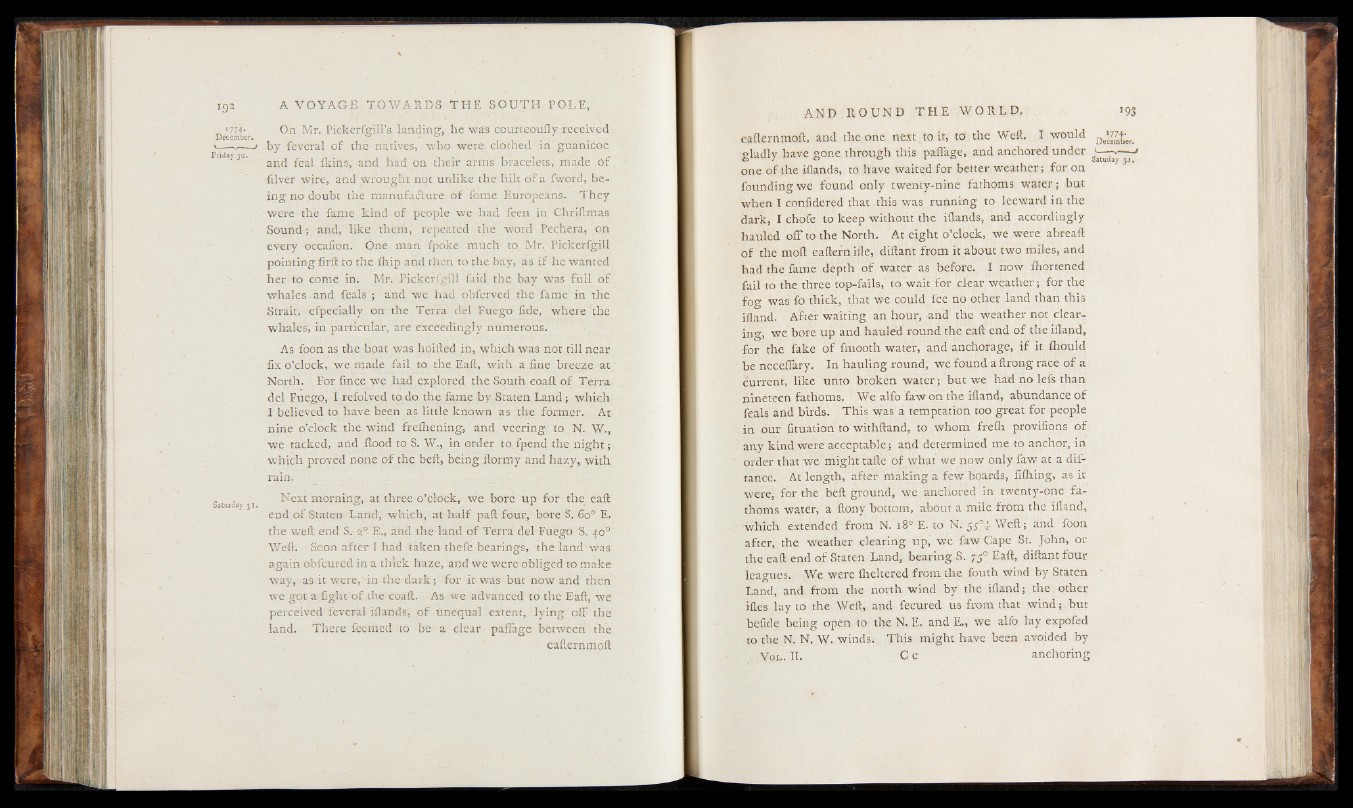
• '774- On Mr. Pickerfgill’s landing, he was courteoufly received
v_— ,--- ; by feveral of the natives, who were clothed in guanicoe
Friday 30. an(^ peaj j[]jjnSj an(j ha(i pn their arms bracelets, made Of
filver wire, and wrought not unlike the hilt of a fword, being
no doubt the manufacture of fome Europeans. They
were the fame kind of people we had feen in Chriftmas
Sound; and, like them, repeated the word Pechera, on
every occafion. One. man fpoke much to Mr. Pickerfgill
pointing firft to the Ihip and then to the bay, as if he wanted
her to come in. Mr. Pickerfgill faid the bay was full of
whales and feals ; and we had obferved the fände in the
Strait, efpecially on the Terra del Fuego fide, where the
whales', in particular, are exceedingly numerous.
As foon as the boat was hoifted in, which was not till near
. fix o’clock, we made fail to the Eaft, with a fine breeze at
North. For fince we had explored the South eoaft of Terra
del Fuego, I refolved to do the fame by Staten Land ; which
I believed to have been as little known as the former. At
nine o’clock the wind frelhening, and veering to N. W.,
we tacked, and flood to S. W., in order tofpend the night;
which proved none of the bell, being ftormy and hazy, with
rain.
„ , Next morning, at three o’cleSck, we bore up for the eaft •Saturday 31. 0 . , r
end of Staten Land, which, at half paft four, bore S. -60°. E.
the weft end S. 2° E„ and the land of Terra del Fuego S. 400
Weft. Soon after I had taken thefe bearings, the land was
again obfcured in a thick haze, and we were obliged to make
way, as it were, in the dark; for it was but now and then
we got a fight of the coaft. As we advanced to the Eaft, we
perceived feveral iflands, of unequal extent, lying off the
land. There feemed to be a clear paffage between the
eafternmoft
eafternmoft, and the one next to it, to the Weft, I would y^S^L.
gladly have gone through this paffage, and anchored under
one of the iflands, to have waited for better weather; for on
founding we found only twenty-nine fathoms water; but
when I confidered that this was running to leeward in the
dark, I chofe to keep without the iflands, and accordingly
hauled off to the North. At eight o’clock, we were abreaft
of the moft eafternifle, diftant from it about two miles, and
had the fame depth of water as before. I now fhortened
fail to the three top-fails,' to wait for clear weather; for the
fog was fo thick, that we could fee no other land than this
ifland. After waiting an hour, and the weather not clearing,
we bore up and hauled round the eaft end of the ifland,
for the fake of fmooth water, and anchorage, if it Ihould
be neceffary. In hauling round, we found a ftrong race of a
current, like unto broken water; but we had no lefs than
nineteen fathoms. We alfo faw on the ifland, abundance of
feals and birds. This was a temptation too great for people
in our fituation to withftand, to whom frefh provifions of
any kind were acceptable; and determined me to anchor, in
order that we might tafte of what we now only faw at a dif-
tance. At length, after making a few boards, fithing, as it
were, for the belt ground, we anchored in twenty-one fathoms
water, a ftony bottom, about a mile from the ifland,
which extended from N. i8° E. to N. 55°-t Weft; and foon
after, the weather clearing up, we faw Cape St. John, or
the eaft end of Staten Land, bearing S. 75° diftant four
leagues. We were (heltered from the fouth wind by Staten
Land, and from the north wind by' the ifland; the other
ifles lay to the Weft, and fecured. us from that wind; but
befide being open to the N. E. and E., we alfo lay expofed
to the N. N. W. winds. This might have been avoided by
V o l . II. C c anchoring